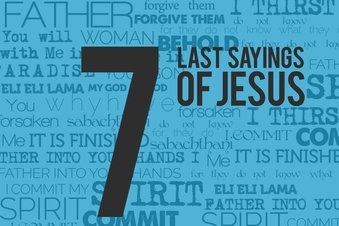
As we might remember from Ash Wednesday Jesus’ first of the last seven words or phrases was one of forgiveness: “Forgive them for then know not what they do” Jesus says of those who are punishing Him and those who eventually kill Him. We are challenged by Jesus to put forgiveness high on our priority list when it comes to our relationships in the world.
In our second week reflecting on Jesus’ words we read in Luke 23:43 “Truly, I say to you, today you will be with me in Paradise.” This is the second of Jesus’ last phrases to those around Him.
Now it is not just the religious leaders or the soldiers that mock Jesus, but even one of the criminals, a downward progression of mockery. But the criminal on the right speaks up for Jesus, explaining the two criminals are receiving their just due, whereas "this man has done nothing wrong." Then, turning to Jesus, he asks, "Jesus, remember me when you come in your kingdom" (Luke 23:42). What wonderful faith this repentant sinner has in Jesus - far more than the doubting Thomas, one of his own Apostles. Ignoring his own suffering, Jesus responds with love and mercy in His second word.
Jesus didn’t need to do this. Anyone who reads this passage is well aware that Jesus has enough going on right now. It would have been understandable for Jesus to just ignore the criminal and focus on His own survival. Jesus chooses to reply. His reply is both a word of forgiveness and a word of inclusion into the Kingdom of God.
The first part of Jesus’ reply is forgiveness. This time directed to a sinner. Just as the first word, this Biblical expression is found only in the Gospel of Luke. Some interesting things to take note of here: first, Jesus does not condemn the man for his own behavior. The criminal is well aware of what he has done, how could he not considering the situation that he is in? Second, the criminal, even before Jesus guarantees him a place in His kingdom, acknowledges Jesus’ divinity and His kingdom. Through this interaction we see Jesus’ forgiveness shine through; much like we did last week when Jesus forgave those who punished and crucified Him.
When one is forgiven by God, they are automatically members of the Kingdom of God. This is the second part of the reply. Being members of the Kingdom of God means two things. First, it means responsibility. Personalizing it, we are to promote the Kingdom of God through our obedience to Christ. In particular, we are to promote the Kingdom of God through loving God with all of our heart, soul, and mind and loving our neighbor as ourselves. The love that we exhibit for both expands the Kingdom of God and allows the work of the Spirit to expand. Second, it means privilege. This privilege is not earned, but given. It is the privilege that says he has eternal life and all the riches that come with bring children of God. We have the privilege of participating in the Kingdom of God and being blessed by this participation.
This phrase of Jesus brings Good News into our world. We receive forgiveness and that gives us access to the Kingdom of God. This access to the Kingdom gives us both privileges and responsibilities. What need to remember in all of this is that it is God through Jesus Christ that provides these for us; forgiving ourselves is not enough. We need forgiveness from the one that we have offended – Jesus Christ. His forgiveness and invitation into the Kingdom of God is everything to us.
 RSS Feed
RSS Feed